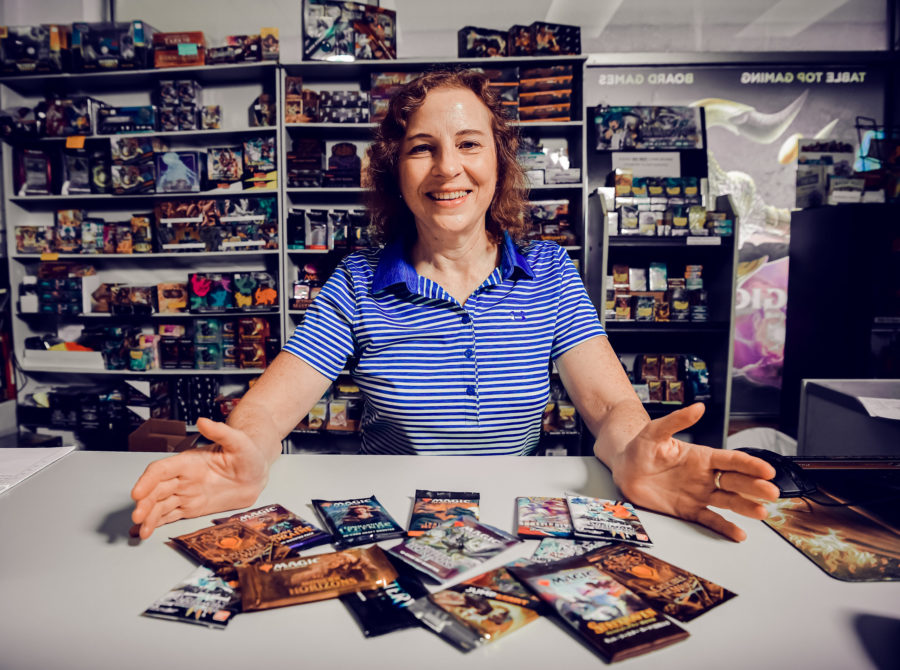
In the late 1980s, it was a teenage ritual. My friend and I would save up — about $20 each, real money then — and plan our pilgrimage to Dream Wizards, the Rockville store that sold Dungeons and Dragons and other role-playing and board games.
It was the mecca for our imaginations.
We would ride the Metro, play real-life Frogger cutting across Rockville Pike and take a stairwell down into a nondescript parking lot where the store was located. There we would linger while deciding which game to buy, our excitement fed by the action-packed covers; we used whatever money we had left to buy the dice needed to play.
“The thing I liked about it most was that you never knew what you would find,” says Adam Guyot, my partner on our teenage trips. “I went in one time and saw Chainsaw Warrior, a board game pretty much explained by its title, which became a favorite.”
Gamers still make pilgrimages to Dream Wizards, now a Montgomery County institution. In 2019, based on available records, Dream Wizards became the longest continuously open role-playing game and board game store on the East Coast. It’s the second-oldest store in the country, trailing only Griffon Bookstore and Games in South Bend, Indiana, which opened in 1976, according to Kelly Mignogna of the Game Manufacturers Association.
The story of the store’s success is full of as many pitfalls and as much magic as the games within. Mark Chorvinsky founded Dream Wizards in 1978 after returning from London, where he was working on his honors thesis about the historical authenticity of the character Merlin.
“While in London, he was introduced to Dungeons and Dragons and the beginnings of miniatures and thought it was very creative,” says his widow and current owner, Laurel Chiat. “He opened the store so he could be around creative people.”
Stores like Dream Wizards opened in the 1970s as role-playing games became popular. But later trends in the gaming market, including computer games and game systems like Nintendo and PlayStation in the late 1980s and the 1990s, decreased the hold that such stores maintained, according to “Heroic Worlds: A History and Guide to Role-Playing Games” by Lawrence Schick.
However, Dream Wizards has always stayed one step ahead of the trends, including being a forerunner in selling Magic the Gathering, a card game in which players battle each other with spells and magical items, and running tournaments for it, starting in 1993.
“The first time we had [Magic the Gathering] in the store, one of the friends of the designer came in [as a customer] and taught us how to play. Within a year, I was running large tournaments sponsored by the manufacturer, Wizards of the Coast, with 300 to 2,000 people in hotels in D.C.,” Chiat says. “We knew how to do it, run a good event. Magic is [still] a huge, huge game.”
In the late 1990s, Pokémon toys — anime animals with vivid colors and cartoonish characteristics — were released in Japan. They caught the attention of Chiat and her husband.
“He read about Pokémon in a Nintendo magazine,” Chiat says. “He thought they were so cool and wanted to get some for our son.”
So, they devised a way to import them.
“Golf companies [in Japan] were mailing golf clubs to Japanese-American distributors in the U.S. To make their customers’ kids happy, they were putting Pokémon toys in the boxes,” Chiat says. “We contacted the distributors and asked them to send some to us. Everything we got sold immediately just based on the cuteness of the characters,” Chiat says.
When the Pokémon card game debuted in America, Wizards of the Coast, which held the game’s U.S. distributorship, let the store run tournaments.
“I was one of the first people to run them in the U.S.,” Chiat says.
Then, in 2005, Chorvinsky died from cancer at age 50. It was the Dream Wizards community that helped the store survive.
“When my husband was sick, people came up to me, volunteering to work in the store. That is an amazing thing I don’t take for granted,” Chiat says.
Even during the pandemic lockdown, the store soldiered on. Employees delivered products to customers’ homes and kept up the Dream Wizards profile on social media. Staff ran games over Discord, an app that allows people to talk to each other online.
A blindingly loyal clientele also helped.
“The day I started [being open again], a gamer walked in and said, ‘Hi, I really like your store. I want it to survive, and I am here to spend money,’” Chiat says.
On a Saturday afternoon in July, customers browsed the merchandise in the front half of the store. Dream Wizards features a wide variety of games: the well-known, such as the board game Settlers of Catan, and the obscure. At folding tables set up in the back, a rowdy group played Magic the Gathering, excitedly slapping cards down in front of each other.
Dave Robertson of Rockville, one of the participants that day, says he plays Magic at the store whenever he can.
“There is really a good group of people here. They are willing to play a lot of games; it just makes you want to come back,” he says.
Peter Norris, who would frequent Dream Wizards before moving out of state, misses it.
“I don’t have a local game store [here],” Norris says. “None of them were as open, or was a hub where people would gather there, instead of just buying their stuff and leaving.”
Dream Wizards’ collegial atmosphere has even sparked romance. Matthew Peters and Martina Brym met there while playing “hours and hours” of Dungeons and Dragons, according to Peters.
“My attitude has always been to be really open,” Chiat says. “We strive to make Dream Wizards a community of openness and inclusivity where all feel welcome. By playing as gamers, we can have conversations.”





I can’t speak for the GAMA records, or what’s considered a RPG and Board Game store, but at least until the store closed in 2020 with the owner’s retirement, Boardwalk Hobbies in Cincinnati, OH was older than either of the stores in this article, opening in 1972.